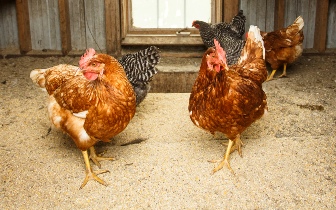Proper Bedding for Chickens

The most common myth about chickens is that they stink. They certainly do when they are crammed into buildings lacking fresh air or when their bedding gets wet – but for a backyard flock just a few simple tips can help minimize odors in your chicken coop.
A key to keeping chickens healthy and odor free is the proper use of coop bedding, or litter as it’s usually called. There are many types of litter but to function well all must be able to absorb some moisture, insulate the floor from cold, and give chickens a chance to dust.
Unlike mammals, chickens don’t produce urine. All excrement leaves their bodies as solid feces, which helps keep litter dry.
By far the most commonly used litter is wood shavings, sold in feed stores, or scrounged from woodworkers. Wood shavings have a pleasant smell, are amazingly absorbent, and don’t pack down. Sawdust also works well but is dusty. Chickens stir it up and dust settles on anything in the coop. Straw is another common bedding. It’s inexpensive but not nearly as absorbent as wood chips. Straw mats down and is harder to shovel out than chips. Dry leaves can be used to make effective litter. They’re free but only available in the fall and tend to break down into dust rather quickly.
Litter must stay dry to remain odor free. Four to six inches of dry wood shavings easily last six months or more before it needs to be changed. Droppings become incorporated into the shavings, as the chickens stir it. About every six months you can scoop the old litter out of the coop with a shovel (a snow shovel works well) and replace it with fresh chips. Used bedding can be either composted or a thin layer can be worked into garden soil to provide nutrients and water absorbency.
When litter gets wet, usually when a waterer leaks or tips over, it’s essential to immediately remove the soggy shavings and replace them with fresh dry ones. Otherwise, they will soon smell.
Chickens love to dust themselves and will readily fluff litter into their feathers. Following a brief dust bath the birds are as fresh as a human emerging from a shower, and as the dust works between their feathers it discourages parasites.
